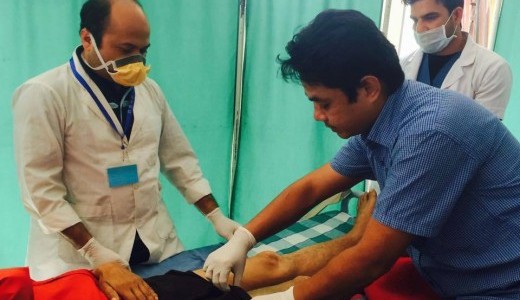Vancouver physicians support rehab centre in Nepal
When Dr. Scott Paquette learned of the devastating earthquake in Nepal, his thoughts turned to all the people he knows there, especially the team at the Spinal Injury Rehabilitation Centre (SIRC) near Kathmandu.
“I went to Nepal in 2010 and again in 2013, and I’ve come to know the team and the very poor facilities they have to work in,” says the spinal neurosurgeon at the VGH Blusson Spinal Cord Centre.
Fortunately, the SIRC is still standing. Sadly, it’s busier than ever.
“Disasters like the Nepalese earthquake cause many deaths and many extremely serious injuries, including fractures, brain injuries and spinal cord injuries,” says Dr. Peter Wing, Clinical Prof Emeritus, Division of Spine, UBC, and retired spine surgeon.
Peter is co-founder of the Nepalese Spinal Cord Injury Collaboration — Spine Nepal — a small medical-surgical team, mostly from VCH/UBC, that’s been working for five years with the SIRC to train medical staff in the subspecialty of spinal cord injury (SCI) care.
The 50-bed SIRC in Nepal has provided care for over a decade. Without medical insurance; all costs are borne by the centre. The demand now for beds for the many newly injured is intense: new patients arrived within days of the quake, and 100 or more are expected to arrive following surgery in the next few weeks.
Spine Nepal provides remote and on-site education, including the sponsoring of two Nepali physicians in training: Dr. Raju, a rehab Resident, and Dr. Prakash, a neurosurgery Resident.
“They’ve been working around the clock to care for earthquake survivors,” says Scott. “SCIs depend on urgent treatment to prevent deadly complications. There’s a lot work ahead.”
As members of Spine Nepal, both Scott and Dr. Rhonda Willms, GF Strong Rehabilitation Centre, have visited the SIRC in Nepal, and they continue to volunteer their time. “Not a week goes by that I don’t receive a request for advice,” says Scott.
Dr. Andrea Townson, also of the GF Strong Rehabilitation Centre, is new to Spine Nepal. She and Rhonda will be using Skype to provide on-line medical teaching and case reviews.
“We’re not trying to be heroes,” explains Scott. “Our aim is to establish a sustainable local program. Every consult, every interaction, is a step in that direction, and I look forward to returning to Nepal again.”
Visit the Spinal Cord Injury Collaboration Nepal website to learn more.

